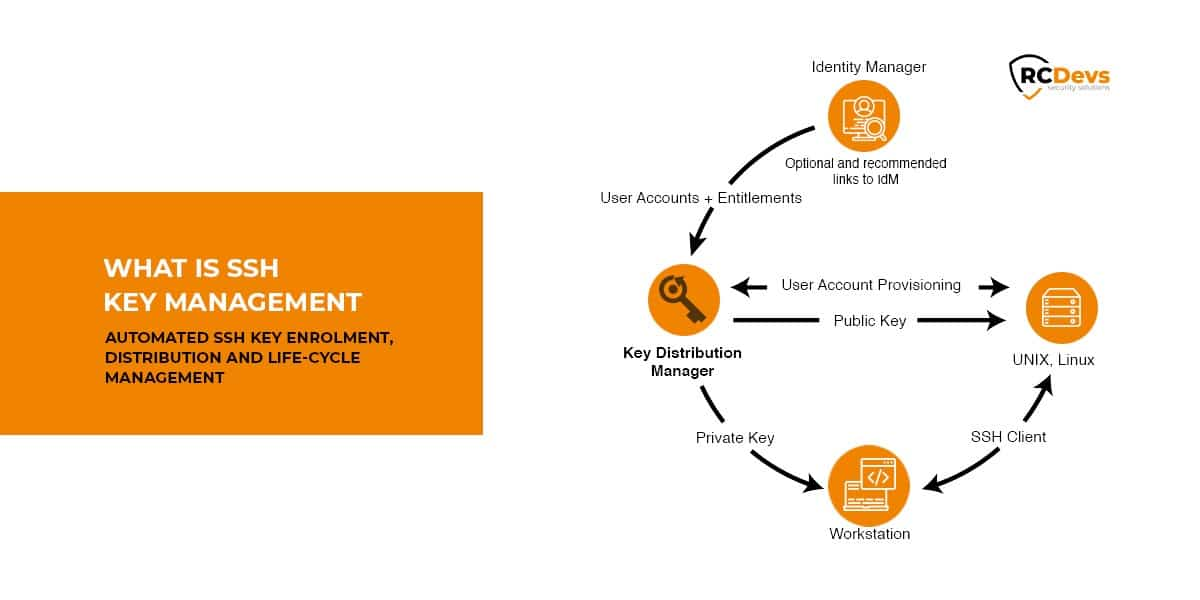Mastering SSH Key Management Best Practices: Your Ultimate Guide
SSH key management is no joke, folks. It’s like the digital lock that keeps your servers secure from unauthorized access. But, here’s the kicker—just having an SSH key isn’t enough. You need to manage it properly, or you’re leaving your systems vulnerable to all sorts of nasties. Imagine this: someone gets their hands on your private key, and bam! They’ve got the keys to your kingdom. That’s why SSH key management best practices are essential if you want to sleep soundly at night knowing your data is safe.
Now, I know what you might be thinking—“Isn’t SSH just for tech geeks and server wizards?” Well, not exactly. Even if you’re not a full-time sysadmin, chances are you’ve dabbled with SSH at some point, whether it’s connecting to a remote server or setting up Git repositories. And let’s face it, the more SSH keys you have floating around, the harder it becomes to keep track of them. That’s where proper management comes in.
But don’t worry, I’m not here to scare you. Instead, I’m going to break down everything you need to know about SSH key management best practices in a way that’s easy to digest. By the end of this article, you’ll be a pro at securing your SSH keys and protecting your systems from potential threats. So, buckle up, and let’s dive in!
Table of Contents
- What is SSH Key Management?
- Why SSH Key Management Matters
- SSH Key Management Best Practices
- Key Rotation Strategies
- Auditing SSH Keys
- Tools for SSH Key Management
- Security Risks in SSH Key Management
- Compliance and SSH Key Management
- Tips for Beginners
- Wrapping It Up
What is SSH Key Management?
Alright, let’s start with the basics. SSH (Secure Shell) is a protocol that allows you to securely access remote servers or devices over an unsecured network. Think of it as a digital handshake that verifies you’re who you say you are before granting access. SSH keys are like the secret codes that make this handshake possible.
Now, SSH key management refers to the processes and tools you use to create, store, monitor, and revoke these keys. It’s not just about generating keys—it’s about making sure they’re used responsibly and securely. Without proper management, SSH keys can become a liability rather than an asset.
How SSH Keys Work
SSH keys come in pairs: a public key and a private key. The public key is like your business card—you can share it freely with servers you want to connect to. The private key, on the other hand, is like your secret password. You never share it, and you keep it super safe. When you try to connect to a server, the server checks your public key against your private key to verify your identity. If everything matches, you’re good to go.
Why SSH Key Management Matters
Here’s the deal: SSH keys are powerful. They can grant access to sensitive systems, databases, and applications. But with great power comes great responsibility. If SSH keys aren’t managed properly, they can become a major security risk. Think about it—what happens if someone gets their hands on your private key? Or if an old employee still has access to your systems because their SSH key wasn’t revoked? Not good, right?
Proper SSH key management helps you avoid these pitfalls. It ensures that only authorized users have access to your systems and that any outdated or compromised keys are promptly removed. Plus, it gives you peace of mind knowing that your data is protected from unauthorized access.
Real-World Examples
Let me give you a quick example. A few years ago, a major tech company fell victim to a data breach because an old SSH key was left lying around. Hackers found the key, used it to access the company’s servers, and caused all sorts of chaos. This could’ve been easily avoided with proper SSH key management practices. So yeah, it’s a big deal.
SSH Key Management Best Practices
Okay, now that we’ve established why SSH key management is important, let’s talk about how to do it right. Here are some best practices to keep your SSH keys secure and your systems safe:
Create Strong SSH Keys
First things first—make sure your SSH keys are strong. Use modern algorithms like Ed25519 or RSA with a key size of at least 2048 bits. Avoid using outdated algorithms like DSA, which are no longer considered secure. Also, don’t forget to protect your private key with a passphrase. It’s like adding an extra layer of security to your digital lock.
Limit Key Usage
Don’t just hand out SSH keys like candy. Limit the number of keys you create and restrict their usage to specific users or systems. You can also set expiration dates for keys so they don’t hang around forever. This way, if a key gets compromised, the damage is minimized.
Store Keys Securely
Your private key is like your digital crown jewels. Keep it locked up tight! Use tools like ssh-agent or hardware security modules (HSMs) to store your keys securely. And whatever you do, don’t store your private key in plain text or share it with anyone. Trust me, it’s not worth the risk.
Key Rotation Strategies
Key rotation is another critical aspect of SSH key management. It’s like changing the locks on your house every few years to make sure no one has a spare key lying around. Here are a few strategies for rotating SSH keys:
- Time-Based Rotation: Set a schedule for rotating keys, say every six months or a year. This ensures that old keys don’t stick around longer than necessary.
- Event-Driven Rotation: Rotate keys whenever there’s a major change, like an employee leaving the company or a security incident. This helps you stay ahead of potential threats.
- Automated Rotation: Use automation tools to handle key rotation for you. This saves time and reduces the risk of human error.
Auditing SSH Keys
Auditing your SSH keys is like doing a security check on your house. It helps you identify any weak points or vulnerabilities in your key management process. Here’s how you can conduct an SSH key audit:
Identify All Keys
The first step is to find out how many SSH keys you have and where they’re being used. This might sound easy, but trust me, it can get messy. You might discover keys that were forgotten about or left behind by former employees. Once you’ve identified all your keys, you can start cleaning house.
Review Key Permissions
Next, review the permissions associated with each key. Are they being used for the right purposes? Are they restricted to specific users or systems? If not, it’s time to tighten up those permissions. Remember, the fewer people who have access to your systems, the better.
Document Everything
Finally, document your audit findings and create a plan for addressing any issues. This will help you stay organized and ensure that your SSH key management process is up to snuff.
Tools for SSH Key Management
Let’s face it—managing SSH keys manually can be a real pain. That’s where tools come in. There are plenty of great tools out there to help you manage your SSH keys more efficiently. Here are a few of my favorites:
- HashiCorp Vault: A powerful tool for managing secrets, including SSH keys. It offers features like key rotation, access control, and auditing.
- SSH Key Management by SSH.COM: A dedicated solution for managing SSH keys across large organizations. It includes features like automated key discovery and rotation.
- Ansible: An automation tool that can help you manage SSH keys as part of your infrastructure-as-code workflows.
Security Risks in SSH Key Management
Even with the best practices in place, there are still security risks associated with SSH key management. Here are a few to watch out for:
Unauthorized Access
If someone gets their hands on your private key, they can access your systems without needing a password. This is why it’s crucial to protect your private key and limit its usage.
Key Leakage
SSH keys can sometimes end up in places they’re not supposed to be, like public repositories or shared folders. Regular audits can help you catch these leaks before they become a problem.
Outdated Keys
Old SSH keys that aren’t properly revoked can become a security risk. That’s why key rotation and expiration are so important.
Compliance and SSH Key Management
SSH key management isn’t just about security—it’s also about compliance. Many industries have strict regulations around data protection and access control. If you’re in one of these industries, you need to make sure your SSH key management practices align with these regulations. For example:
- PCI DSS: Requires strict access controls for systems handling payment card data.
- GDPR: Mandates protection of personal data, which includes securing access to systems that store such data.
- HIPAA: Requires secure access to healthcare data, making SSH key management a critical component of compliance.
Tips for Beginners
If you’re new to SSH key management, don’t worry—it’s not as scary as it sounds. Here are a few tips to help you get started:
- Start Small: Begin by managing a few keys manually to get a feel for the process.
- Learn the Basics: Understand how SSH keys work and the importance of private and public keys.
- Use Tools: Once you’re comfortable with the basics, start using tools to automate and streamline your SSH key management process.
Wrapping It Up
So, there you have it—your ultimate guide to SSH key management best practices. By following these tips and strategies, you can keep your SSH keys secure and your systems protected from unauthorized access. Remember, SSH key management isn’t just a one-time task—it’s an ongoing process that requires vigilance and attention to detail.
Now, it’s your turn. Take what you’ve learned and start implementing these best practices in your own SSH key management process. And don’t forget to share this article with your friends and colleagues who might find it useful. Together, we can make the digital world a safer place!

What is SSH Key Management Complete Guide RCDevs

SSH Key Management Best Practices and Tools OpenSource Java SSH

What is SSH Key Management? What are SSH Key Management best practices?